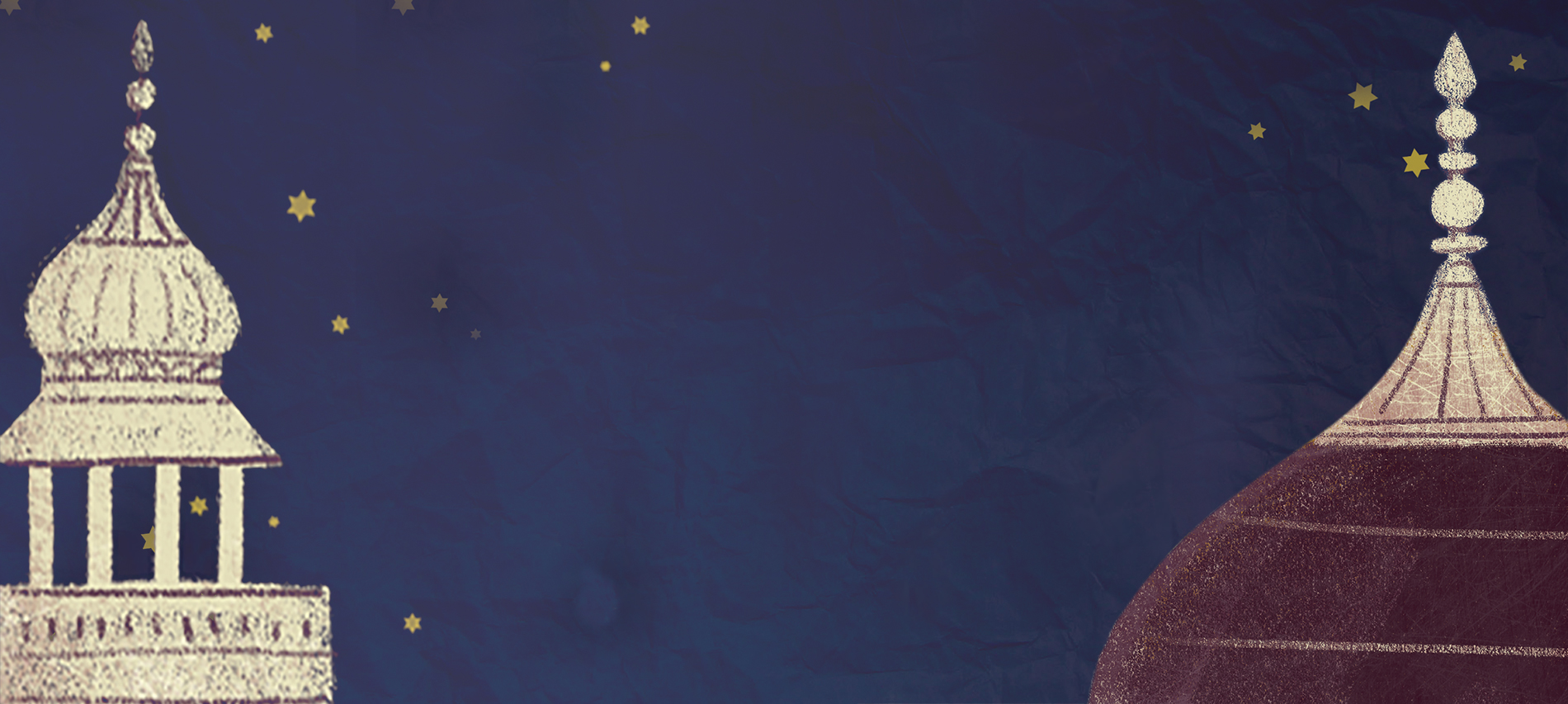What do we understand by the term ‘freedom’? The liberty to make our choices, the liberty to lead the life we want, the liberty to speak the language we choose. But does freedom mean the same thing to everyone?
Here are 7 quotes by famous writers with different meanings to ‘freedom’.
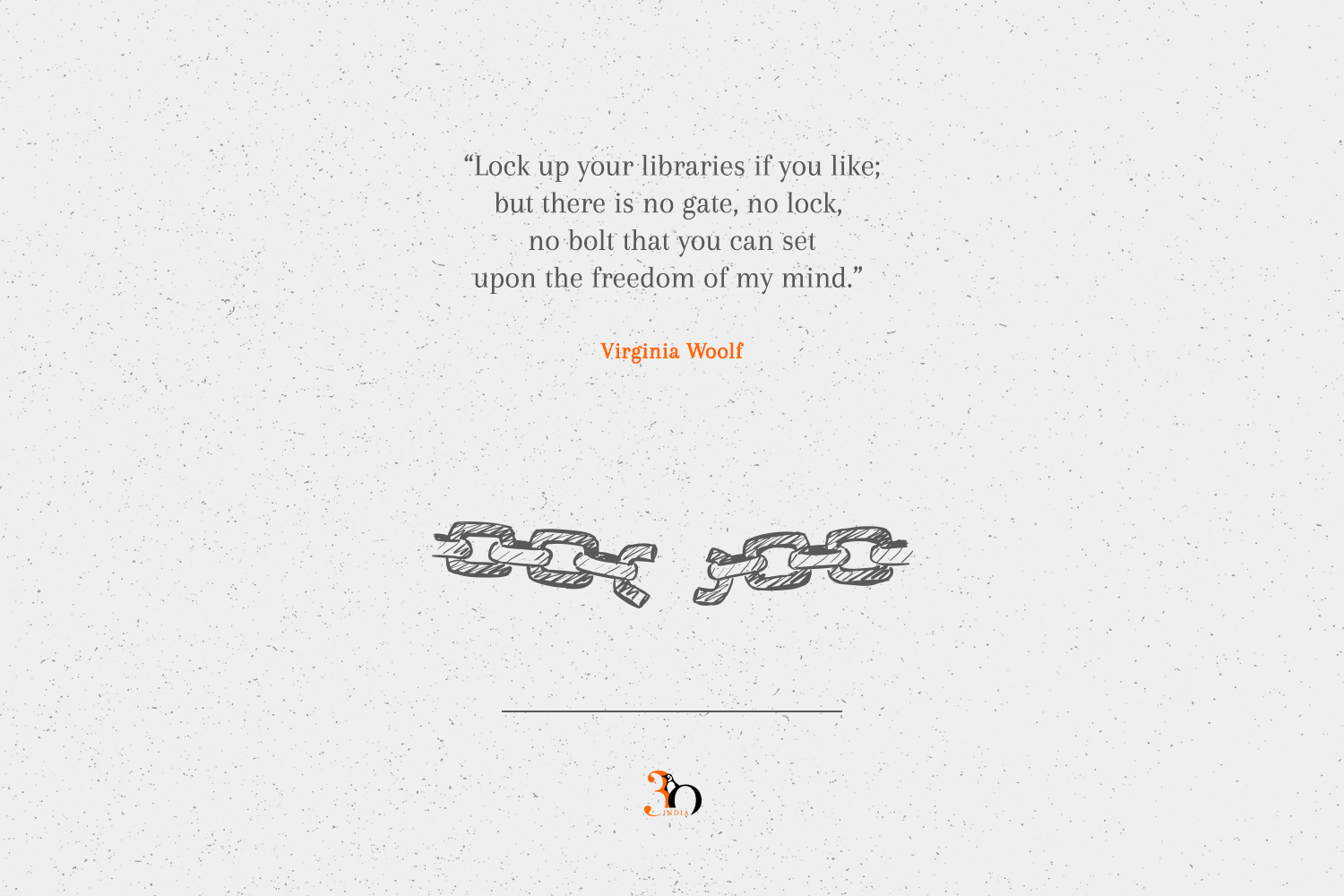
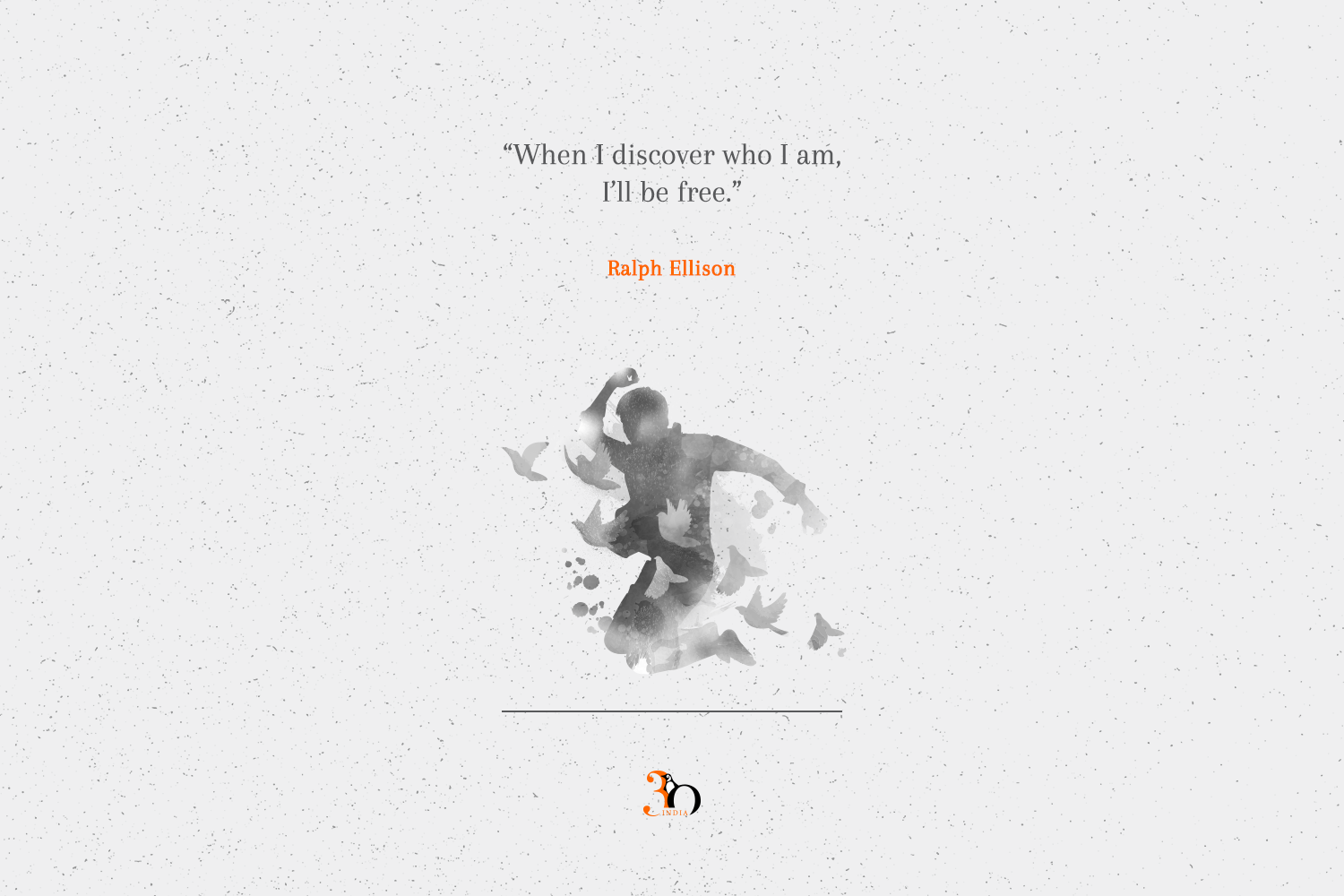

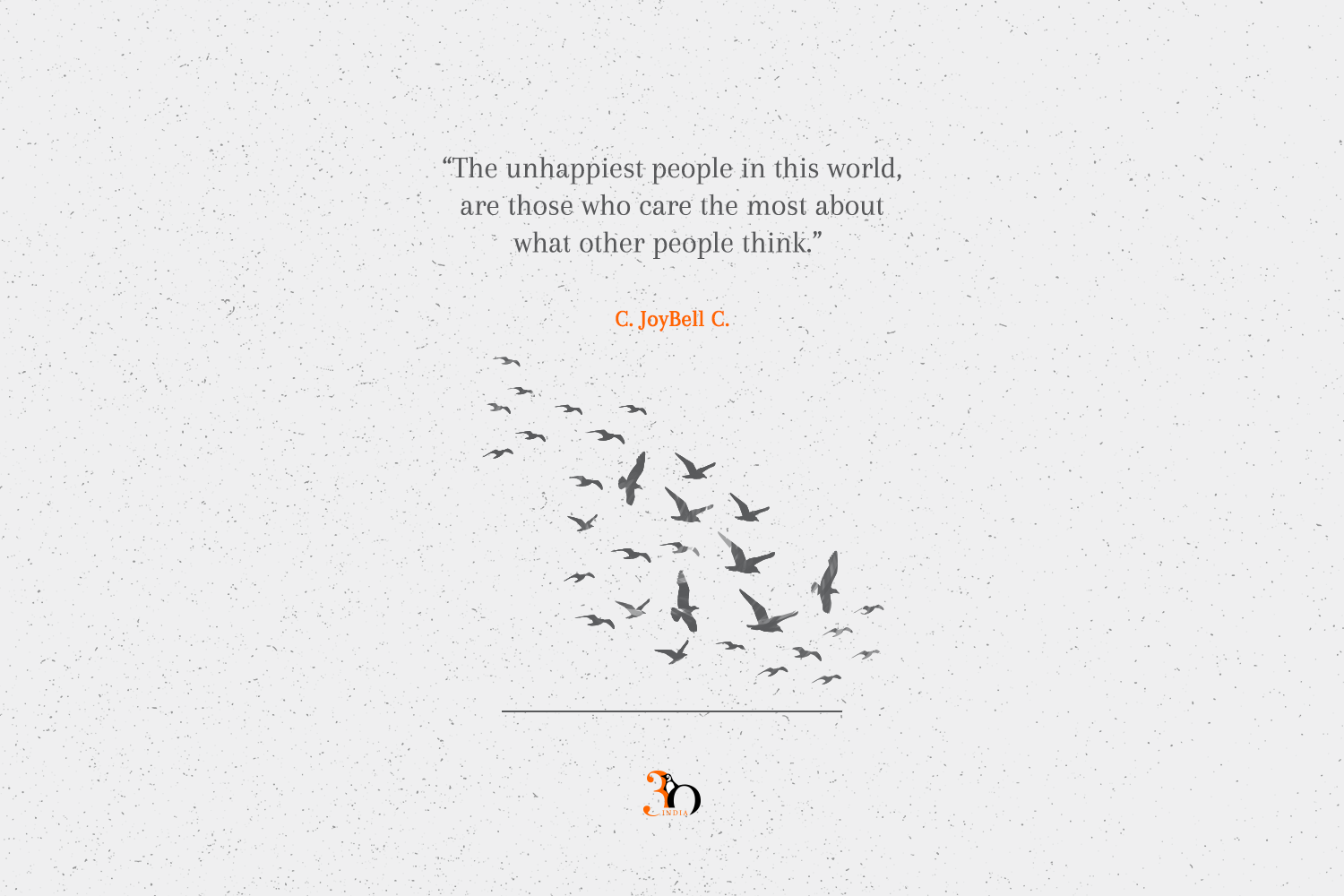
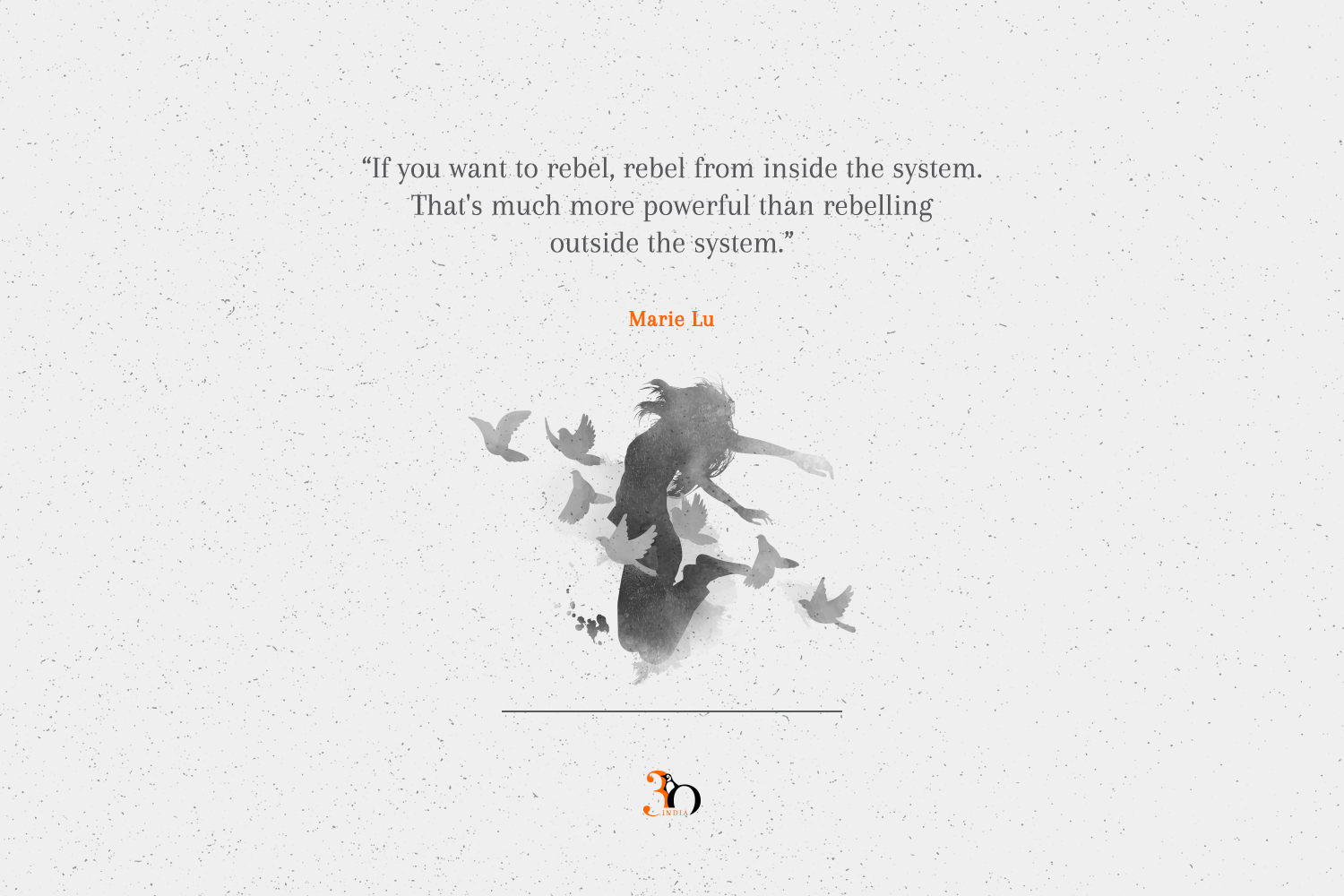
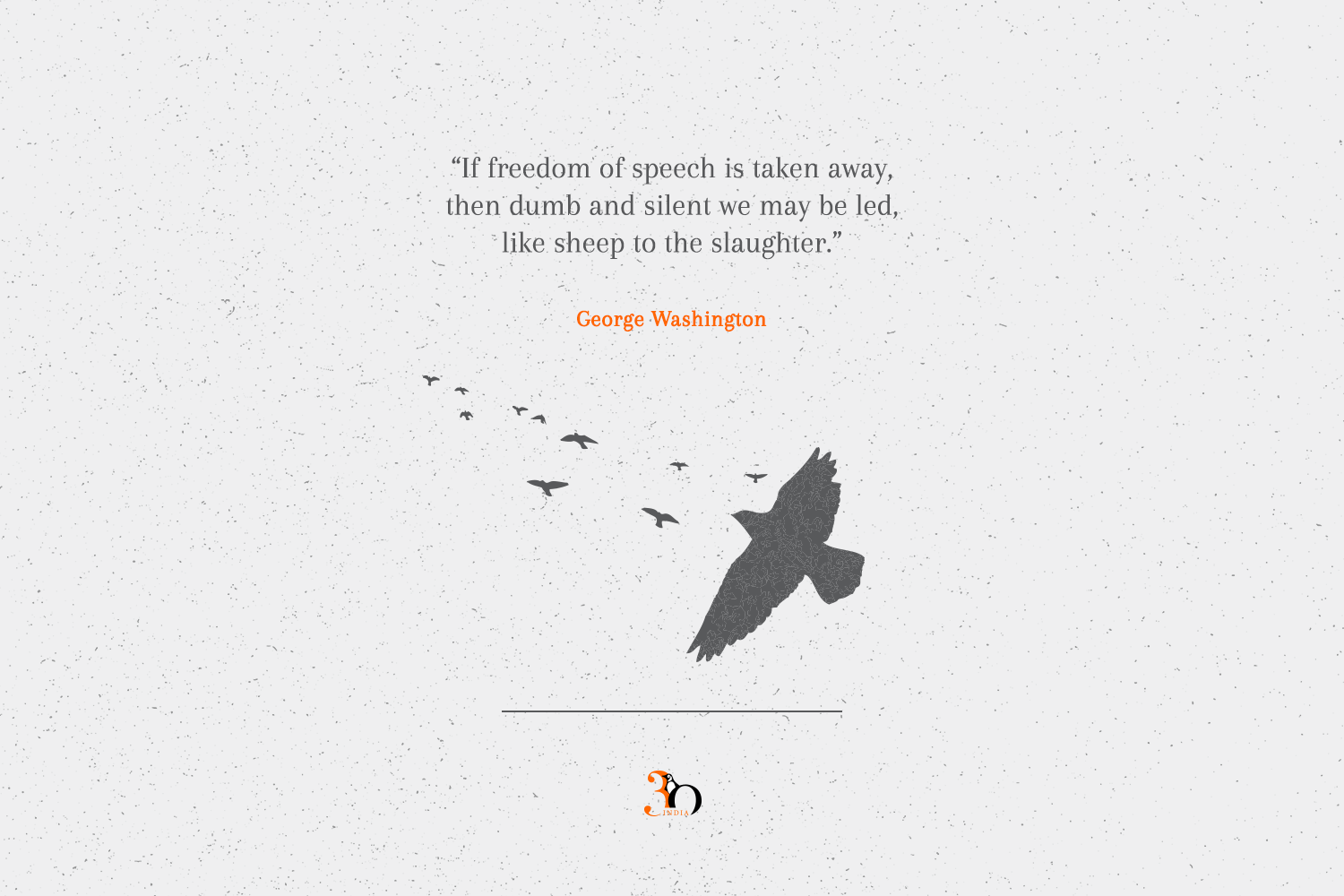
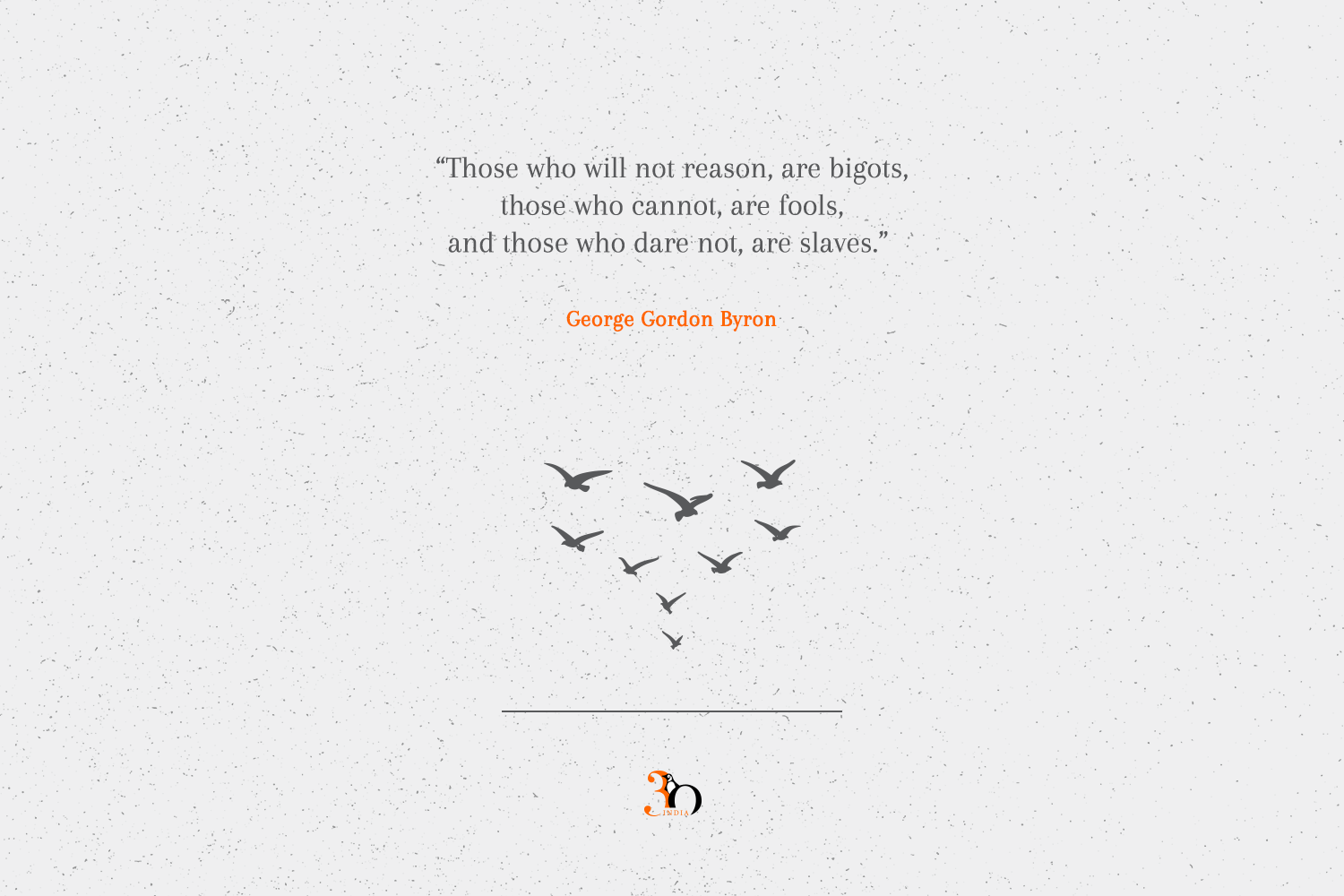
Tell us which idea of freedom do you agree with!
Tag: writing
Michael Burns Gives the Tips to Hack into Your Creativity
Michael Burns is a university teacher, writing coach, actor, editor and storyteller. He has directed five films for international television and his work has been seen in over twenty countries. He moved to India in 2011, and founded Tall Tales, the country’s longest-running, live-storytelling event series. He also conducts popular writing workshops around India.
Here’s what he has to say about his book Hack Into Your Creativity
Everyone has at least one great story. What’s yours?
If you’re reading this book, welcome.
I’m so glad we’ve found each other.
This is a book of story prompts: ideas, questions and thought experiments for you to enjoy and to write on. They’re designed to stimulate, energize and challenge you (the third of these being the most important). They’ve been written in a particular manner so that the maximum number of people can relate to them in some way. The writing that they inspire is best when it’s detailed, original and sourced from deep inside the writer’s heart and mind. There are eight categories of prompts:
- What Happens Next?
- Character-Building
- Incredible India
- Genres
- Everyday Magic
- Two-Parters
- Integration
- Every Hair on Its Head
Each of these subjects starts with a mini introduction to the category. Work your way through them or skip around if there’s a particular skill that you need to work on. I’ve added extra pages at the end of this book for you to write in, but I would recommend combining this text with a notebook so that you never run out of room for epiphanies.
This collection differs from other story-prompt resources in a few important ways. First, the prompts that follow are not random, provocative words or phrases designed to stir you to write just anything. While there is something to be said for that style, I’ve elected, instead, to put together prompts that help you to investigate visceral, transformational and pivotal moments in storytelling. This way, your writing is targeted and helps fabricate a tool that you can use on a regular basis and even in the most dramatic points in your future stories. So, there’s a special emphasis on dramatic tension. Second, this collection also readily explores both fiction and non-fiction because both are essential skills. As all writers know, your ability to find depth and nuance in fictional characters is only possible if you’re willing to, at some point in time, turn that high-powered lens back on yourself. Third, in the vast majority of cases I’ve kept the prompts targeted but very simple, steering clear of the types of prompts that shout, ‘Look how clever this story starter is!’ and instead tried to keep the focus right where it should be: getting you started down a path to discover how clever you are. Fourth, and perhaps most importantly, as suggested above, this book offers you a curated sample of many different kinds of prompts that speak to the many different kinds of storytelling that a writer will likely indulge in—from introspective questions and sentence integration to science-fiction plot twists and character development. In other words, there is a substantial selection of varied prompts to suit your particular interest, mood or even work-related priorities.
These prompts are both specific and flexible. Just like an exercise machine at a gym, the prompts are designed to get you to work on a specific skill, but they can and should be adapted as necessary. I have randomly assigned pronouns (he or she) to the prompts, details that are obviously yours to change at will. I have also suggested goals for the amount of writing you should do after each prompt. This is just a minimal suggestion to help you create a proto-story, a foundational core that can give rise to a story over time. (Having said that, obviously, if you’re set on fire by a topic, with sparks flying off the end of your pen, keep writing!) Having a proto-story as a goal is important because a quality story is not something that usually reveals itself in one inspired session. It evolves over time and builds like a snowball. Some ideas are discarded while others are expanded. Therefore, a reasonable goal for yourself should be to meet at least the minimum lengths I’ve suggested and to infuse those seeds with so much love that they’re busting to grow. A more advanced goal might be to pair this book with your understanding of the universal story structure, giving your writing exposition, rising tension, and a satisfying but unexpected resolution. At the very least, consider three short acts for a simple story structure: let the prompts set things in motion, then let disaster strike your scene, and then finally, see if the characters you’ve created will be ingenious enough to survive or be overwhelmed enough to be snuffed out.
Treat this book as a source of inspiration when you need some. Treat it like a partner to help you get under the surface and beyond the barriers that might be temporarily blocking your creativity. Perhaps, above all, treat it as activation energy. Every chemist knows that reactions need a little push to get them going. And once the reactions start and combinations begin to agitate, percolate and transmute in the unpredictable ways that they sometimes do, you never quite know where you’ll end up.
So, as we get started on creating together, peace be the journey—the alchemist’s journey.
This is an excerpt from Michael Burns’ Hack Into Your Creativity.

5 Ways to Overcome Writer’s Block
If you’re a writer, you must have experienced the treacherous phenomenon called the ‘writer’s block’. It is the phase when you feel stuck and drinking any amount of coffee cannot get you to finish that one page.
Michael Burns, author of Hack Into your Creativity, gives us some brilliant writing tips and prompts for every type of writer to help them out of the ‘block’.
Here are five easy and exciting ways you can overcome writer’s block:
Writing Prompts

What Happens Next?

Character Building

Genres

Everyday Magic
Art in the Time of Orthodoxy
By Faiqa Mansab
There is a saying in Punjabi: When you make friends with elephants, you should build bigger doors. I’ve always felt that’s an apt way of describing what being an artist means. Art is the elephant; and an artist must make space for the subsequent battles that their art lets into their life. Such battles are small at first: about time spent doing ‘better, more useful things’; then the battles are angrier, ‘you want to end up dead?’ Rubbing the orthodox demagogues, the wrong way isn’t safe in my country and I chose to write stories that are taboo, dangerous even, in the current scenario.
For orthodoxy and extremism to succeed—and they are conjoined twins—a single identity is imperative. Plurality weakens the declaration of ‘us’ versus ‘them’ necessary to the narrative of dogma and so plurality is being systematically shunned. When religion is constructed as the defining feature of a society, then any difference in opinion is perceived as a threat. The bid for a religious identity must be singular, and it must be patriarchal—much like the concept of nationalism. Such an ideology is based on binaries: one must hate in order to love. Extremism is a necessary tool to the fulfillment of nationalistic jargon and jingoism, even though both are in response to global power dynamics and socio-economic oppression.
The battle between organized religion and spiritualism is as old as religion itself. Art for me is a kind of spiritual expression. Doctrine commands that life must be lived with rules. An artist, by nature, flouts rules. Spiritualism suits me better than orthodox tenets, even if spiritualism is currently out of favor within the society and State I call home. This is precisely because conventional religious dogma suits the State. Orthodoxy means rules, rules mean control and control means power.
It isn’t a West versus Islam condition at all. Even a largely Muslim majority country like Pakistan is facing ethnic and sectarian issues because difference is not tolerated in any form at any level. Look at what is happening at Sufi shrines, the very cradle of love and tolerance is being targeted to reinforce orthodoxy.
Extremism around the world is fed by the ‘us’ versus ‘them’ psyche, spreading like a contagion; and it is not just xenophobic, Islamophobic, anti-Semitic. Shia versus Sunni; liberal versus conservative, orthodox Muslim versus Sufi Muslim, neighbor versus neighbor—as if 1984’s Orwellian universe has become the new reality. These days one must have a single identity to be considered ‘true’ to one’s country, one’s race, one’s people. Not having a single identity makes one suspect. Plurality and hybridity are threats to be eliminated. Hence the witch hunt against seekers of truth—journalists and artists ongoing in Pakistan.
When society is divided between self-proclaimed self-righteous soldiers of God and ‘others’, then any deviation is open to interpretations of madness, of rebellion and sin. When ‘justice’ is meted out by mobs, and social media becomes a platform for shaming and blaming rather than a platform of freedom of speech, then extremism has already infected the socio-political fabric of society. It is already an unstable environment where conformist thinking has taken strong root and flowered into radicalism. These conditions bother me and in my stories, I’ve tried to depict this volatile and insecure place where law is open to interpretation by the highest bidder.
There is a lovely poem in Urdu by Dr. Khalid Javed Jan “Main Baghi Hoon”. It’s a beautiful poem about an artist, a person of principles, who is aware that he dares to do the right thing by speaking out against oppression. It’s one of my most favorite poems.
Man is a political animal. So is woman.
The worst off in this tussle, as in many other power struggles over the past centuries, are women. Their bodies are the site of struggle between conformist and liberal thinkers, and patriarchal wars are waged on their bodies. Should women be ‘allowed’ to wear the hijab? Should they be ‘allowed’ to wear burkinis? Should they be ‘allowed’ to wear bikinis? If perchance, it’s the body of an immigrant woman, then the right to speak about it, to dictate to it, to pass laws and judgment on it, increases manifold.
It began with Eve, who was not only an exile but also an immigrant. She came to a new world, leaving the familiar, her home—the Garden of Eden (‘Home’ is always the garden of Eden in memory and nostalgia) looking to build a new life with Adam on Earth. Immigration is ingrained in human psyche. It is a natural progression for some, a necessary act of survival for others.
There is another kind of immigration that the world finds problematic: the one between genders. Where do people of indeterminate gender, people who choose to change their sexual identity go? There is no country for queer people.
We can all agree that gender is a political declaration. My novel, This House of Clay and Water tells the stories of Bhanggi, Nida and Zoya, a hermaphrodite, a woman, and a child who are victims of their place, their society and culture, because of their genders and because they do not conform. Gender is still at the heart of power struggles in a lot of places in the world. And place, space, position is important in negotiating with power. Where one is from, and where one can go, are equally dynamic parameters of negotiation.
I often wonder, what art means. It is a roar against patriarchy for me, and it is a declaration of independence against conformity. Art reflects its times and the response of people to those times.

The Legal Eagle – An Excerpt
Harish Salve’s name ranks amongst the brightest legal luminaries of India. After an illustrious career of nearly two decades as a Supreme Court lawyer, he served as the Solicitor General of India from 1999 to 2000. A highly sought-after practising lawyer, his client list includes corporate bigwigs like Ratan Tata, Tina Ambani and Lalit Modi, as well as powerful politicians like Mulayam Singh Yadav and Prakash Singh Badal, and also Bollywood actor Salman Khan. He represented Vodafone in the well-known tax case with the Indian government which was finally decided in Vodafone’s favour. He was the counsel of choice for Mukesh Ambani’s Reliance Industries Limited in big-ticket cases like the Krishna Godavari Basin gas dispute and for Ratan Tata in a privacy petition concerning the Niira Radia tapes, as well as for the Delhi Police in the case for its midnight raid over Baba Ramdev’s rally at Ramlila Maidan. Besides representing his high-profile clients, Harish Salve has offered his pro bono services several times as amicus curiae to assist the Supreme Court in cases mostly relating to the preservation of the environment.
It’s a special day when I hear from the country’s pre-eminent lawyer, confirming our meeting in early August in Delhi at his office at ‘White House’ on the premium Bhagwandas Road, a stone’s throw away from the Supreme Court and India Gate in the Lutyens Bungalow Zone. I am excited to meet Harish Salve, though thankfully not for legal reasons!
There are guards posted outside his sixth-floor office. As you go past the reception desk, of the three doors that open into the reception area, the one on the extreme right is Harish’s chamber. It’s elegantly done in dark mahogany wood and expectedly has a wall-to-wall library stacked with gilded books as the backdrop to his revolving black chair. His large glass-top work desk and the set-up around it take up almost one-third of the space.
From a reputed family, with his grandfather being a successful criminal lawyer and father, N.K.P. Salve, a well-known Congress politician of his time, I imagine that Harish would have had success served to him on a platter and I share my view with him up front.
‘Contrary to what you think,’ he says, ‘I had what you may call “a lower-middle-class” upbringing. I come from a life of simplicity and grew up in a house full of relatives. My mother’s elder brother took sanyas (became an ascetic) and left home. His children were virtually brought up by my parents. My mausi (maternal aunt) also lived with us. So my elder sister, five of my cousins, my mausi and I used to sleep in the big living room, with the only bedroom in the house occupied by my parents.’ Harish was brought up by the same mausi, who was a professor of philosophy in a women’s college. Every night, she would put him to bed and read something to him. It was a very down-to-earth upbringing. Sports for Harish in his childhood meant playing football with kids from the chawls behind their house. As he says, ‘So even though I went to a very good school in Nagpur, there was so much learning we had on the football field of different aspects of life while intermingling with children from different backgrounds.’
After school, he chose to do his undergraduation in commerce and joined his father’s chartered accountancy firm for articles. Harish’s father was a practising chartered accountant before he joined politics. He and his partner had a small firm with an annual turnover of about Rs 5 lakh. Remembering those times, Harish says, ‘During my first year of college, I used to travel by bicycle in the sweltering heat of Nagpur.’ Colleges started in the month of March when day temperature in Nagpur is usually above 40 °C and burning. ‘I would come back, have lunch and then leave for office.’ As the peak summer months approached, the temperature would go up to 45 °C and Harish would cycle to office earlier in the morning. ‘There were times when we would be required to go to some factories in the afternoons and do an audit. I remember we used to take a wet towel and put it around our heads to avoid heat stroke and then cycle some 8 kilometres to reach the place,’ he says. ‘The so-called “big entertainment” in college and years after that was to go to a local dairy and have coffee or to go to Hanuman Mandir and have samosas. I usually stayed up the nights and studied. We would go to the railway station and eat at the dhabas there.’ That’s how Harish grew up. He credits these experiences for teaching him some very important values, making sure he’s never lost touch with that part of his life.
‘You switched from commerce to law. How did that happen? Did you complete your chartered accountancy?’
‘The moment I completed my graduation I joined CA, but found it very boring. Though the course was good, I knew that I would not stay in the audit and accountancy field. I was more interested in law and taxation. I completed CA only because it became a matter of prestige. Everyone said, “Yeh toh Salve sahab ka beta hai, ye thodi karega CA” (He is Mr Salve’s son, so he will not do CA) and my reaction was, “Ab toh pass karke chhodunga” (Now I will qualify and prove myself).’ Harish qualified for CA, and within two months gave up his certificate of practice to enrol at the bar. His father was very upset, but Harish was very clear that he wanted to be a lawyer. He had been a (Nani) Palkhivala fan from the age of fourteen as his father’s firm used to consult Mr Palkhivala on taxation matters, and Harish got the opportunity to interact with him a few times on cases wherein his father involved him. Harish thoroughly enjoyed income tax and learnt a lot from Nani, and gradually made up his mind that if he had to pursue taxation, it would be as a lawyer. The time had come for him to chase his dream.
Keen to know more about his relationship with his father, I ask, ‘You completed law from Government Law College, Nagpur, in 1980, and by then you had also managed to complete a couple of years’ internship with a law firm operating out of Nagpur and Mumbai, as well as acquiring the precious experience of working with Nani Palkhivala on the famous Minerva Mill case. Later, Nani recommended that you work as a junior with Soli Sorabjee who was then the Solicitor General of India based in Delhi. At that time, your father was the deputy leader of the Congress in Parliament under the prime ministership of Indira Gandhi and soon went on to hold other important portfolios in the Central cabinet—as minister of state for information and broadcasting (I&B), then minister of state with independent charge for steel and mines. How did the relationship pan out between the father and the son in terms of propriety—you as a budding lawyer and your father as an influential politician?’
‘My father joined politics when I was ten years old. All I have seen is a downslide in the quality of my life from the time he joined politics. His income went down and things didn’t change right through to the time I was doing my CA. I remember my mother telling me, “You cannot eat meat every day.” This is how it was even when my father was a member of Parliament (MP). Though he steadily grew in terms of his political stature, it didn’t translate into financial gains. The sense of righteousness was very strong in him, so he made sure that the boundaries between our professions remained concrete. When my father was inducted as a minister in the Central cabinet in the 1980s, I never attended a single official party. I went to his office only once when he was in the I&B ministry because he wanted me to sign some papers. For several years after my father was the minister of power, I didn’t know that his office was in Shram Shakti Bhawan.’
It was only much later when, as Solicitor General, Harish went to Shram Shakti Bhawan for a meeting with Suresh Prabhu—who was the minister of power then in Atal Bihari Vajpayee’s cabinet—regarding the Dabhol case that he realized that it was his father’s office!
‘When my father was the minister of steel, he called me up one day and said that he wanted to know how much work I had got from the Steel Authority of India in the last year. I totalled it, and it came to about Rs 3000 when I had a practice running into some Rs 40 lakh at that time. When he became the minister of power, he called me and told me that he did not want me to work for any public sector units that came under his ministry.’ Harish assured him he would not and at the same time brought to his father’s attention how there were a bunch of third-grade lawyers whom ministers patronized and that they should be barred from appearing. ‘I ended up becoming the cause for a rumpus that followed in the ministry,’ chuckles Harish and adds, ‘It was only once that I worked for the ministry of power, and then too, instead of getting any benefit, I ended up giving free advice to the government.’
‘You imbibed taxation and law from your family environment. What about politics? Have you ever considered joining politics?’
‘My personal view is that there are two kinds of reactions when you see power and politics very closely—you love it or hate it. I hate it.’ Harish is clear that he has never even considered the idea of joining politics. As a student of public affairs and law, he likes following politics and understanding it because it is important—not in its narrow partisan sense but as an important part of governance.
‘As a renowned constitutional lawyer, what are your observations on India as of today—the way the country is being managed and where it is headed?’
Harish ponders briefly and then very eloquently expresses his key concerns about Indian polity. He cautions and remarks, ‘I think right now India is going through a very negative mindset and if we don’t realize this soon enough and do something about it, we are going to pay a very dear price for it. We have, from about 2011 onwards, created an impression that everybody in power is corrupt, everyone who has a car is a crook, everyone who lives well is a crook. We must realize that India’s biggest fault line is between the haves and the have-nots. In the power game of politics, instead of taking hard decisions for development, people are being pitted as rich or poor—us versus them. In this way, we are gradually cultivating complete disrespect for our constitutional institutions.’
Harish’s analysis is that we are being misled by a wealth-hungry media. The media decides who is corrupt and who is not, and we basically assume if a person is rich and influential, he/she must be corrupt. The reality is that governance comes from institutions, and wealth comes from private capital. By giving them a bad name today, Harish believes we are sawing at the edifice of democracy. This trend is alarming and nothing, nothing appears to be above partisan politics—whether it’s land acquisition, foreign direct investment (FDI), or even the Naga Accord. Not blaming any one political party for it, he points out that everybody does it, with politicians attending to their personal interest first and functioning with a ‘to hell with the nation’ attitude.
However, he acknowledges that we still have a lot of very fine politicians and conscientious MPs, having known them well. ‘There are a lot of lower-middle-class MPs who live in two-bedroom flats and go back to do some good work in their constituencies. But you’ll never hear about those people. On the other hand, if one person makes some communally sensitive statement, it immediately makes for front-page news,’ he says.

In Conversation with Krishna Baldev Vaid
We recently spoke to the author of None Other, the august 89-year old Krishna Baldev Vaid. He is well known for his books The Broken Mirror, Steps in Darkness and many more.
Below are a few questions we asked Vaid to know more about his writing process.
When you get an idea for a book, how does it form into a story? Please share your writing process with us.
It differs in details from piece to piece, from novel to novel, from play to play but essentially, it assumes the urgency and intensity of an obsession that elevates me to a level of receptivity, that is extraordinary if not abnormal, to intuitions, perceptions, choices of words and phrases and puns and euphonious effects, in short a style suitable to the occasion. The emphasis is never on story as such. My stories, both short and long, are never mere stories; my novels and plays do not aim at telling intricate and interesting and eventful stories. They do not require a well-designed plot. They create an atmosphere, an alternative reality, if you will, a universe of words and sounds and suggestions and characters that are both familiar and strange, normal as well as abnormal, mundane and magical, real and unreal, just as in dreams and nightmares.
Do you have any writing rituals that you follow?
I am afraid I do not have any writing rituals except perhaps a room of my own, a closed door, a wall in front of me, a space to pace up and down, silence, sometimes low and slow classical instrumental, preferably sarod, music. I tend to make fun of writing rituals in my novels and stories such as ”Bimal Urf Jayein To Jayein Kahan” (”Bimal in Bog” in English) and ”Doosra Na Koi” (”None Other” in English).
When I was young, I had a somewhat romantic association with writing and artistic rituals. In old age, every elderly movement and gesture and activity automatically and inevitably becomes ritualistic. You don’t need any other rituals.
How do you pick books that you want to translate? Is there a reason behind that choice, such as for Alice in Wonderland?
I am not a professional and a prolific translator into English or Hindi. I think I have translated more of my own stuff in Hindi into English than other writers’—alive or dead. I tend to believe I would have been less of a self-translator into English if there had been an active band of good professional translators into English from Hindi. Perhaps, in that case, I would still have used my bilingualism for doing some selective translations of some modernistic Hindi fiction and poetry as love’s labour or out of a sense of duty; I don’t know.
Two of my dear friends, Nirmal Verma and Srikant Varma, asked me to translate two of their novels, ”Ve Din” (Nirmal) and ”Doosri Baar” (Srikant), and I complied because I liked their work, but I did not ‘pick’ them. In the case of ”Alice in Wonderland”, I chose it for translation into Hindi because of its status as a classic, not only as a children’s book but for ‘children’ of all ages and, I believe, nationalities. I used to read it to my three little girls as they were growing up. Besides, the only great version available in Hindi was a great adaptation by a great Hindi poet, Shamsher Bahadur Singh—”Alice Ascharya Lok Mein.” I wanted to do a translation of the complete original text. The third major translation of an important book-long Hindi poem that I did was ”Andhere Mein” (”In The Dark”) by Muktibodh. I selected it because of my admiration for it as a modern classic by a great Hindi poet who died in splendid neglect except as a cult poet for the discerning younger Hindi poets, without a published collection of his own poetry.
I chose two plays of Samuel Beckett—”Waiting for Godot” and ”Endgame”—in 1968, before he became a noble laureate, because Beckett was my favourite modern writer. I wrote to him for permission while I was a visiting professor in English at Brandeis university. He wrote back a brief but gracious post-card from Paris after a couple of months, granting me permission even though he assumed I’d do my translation from his own English version of those plays written originally by him in French. I wrote back thanking him and mentioning that his assumption was correct even though I assured him that even though my French was inadequate, I’d also take into account his French original of the plays.
In addition to these three Hindi books, I also translated some Hindi poems and stories of some important Hindi writers, only one of whom—Ashok Vajpeyi—is alive: Shamsher Bahadur Singh, Srikant Varma, Muktibodh, Upendranath Ashk, Hari Shankar Parsai, Ashok Vajpeyi. All these have been published in English magazines but not collected in a book.
The only other notable translation into Hindi that I have done was commissioned by the French embassy in Delhi—it was Racine’s ”Phaedra”. I told them my Hindi translation would be from a standard English version of the original French and that I’d consult the original French with the help of my inadequate French. My Hindi version was published by Rajkamal Prakashan and was staged in Bharat Bhavan, Bhopal, and Delhi under the direction of an important and renowned French director, M. Lavadaunt.
How do you decide which language to write in and which one to translate into? And why?
This decision was made by me rather early in my life during my final year of M.A. in English at Govt. College, Lahore when I was only nineteen years old and living under the menacing shadow of the partitioned independence of India into two countries, India and Pakistan. My heart was set on being a creative writer, a fictionist. I already knew that I would have to do something else for earning a living if I wanted to write on my own terms without making any compromise with anybody. I did not want to write in English, even though I was fairly good in it and knew that I’d get better, because I didn’t consider it as an Indian language and did not dream in it. I didn’t want to choose Punjabi as my medium of creative expression, even though it was my mother tongue, because I didn’t consider it rich enough. The choice was between Urdu, which I was also good at thanks to my proficiency in Persian, and Hindi which I had almost entirely taught myself thanks to the similarity of its and Urdu’s grammar and syntax. With more of Hindi reading and the help of a good dictionary and with an openness to Urdu and Persian for the enrichment of my vocabulary, I could forge a style of my own that might even be better than standard stultified Hindi, or Urdu for that matter. I soon was able to achieve a style of my own free from the stiffness of both standard Hindi and Urdu and also the simplistic hotch-potch of the so-called Hindustani.
English is the only language I can translate my own Hindi books into; my own kind of Hindi is the only language that I can translate any English book into. Since I translate only what I like and want to and since I do not do it for my living, I do not do much translation. And now I am approaching the end and the final goodbye to all this.
Does the translation process differ when you are translating a book by an author other than yourself?
Yes, it does. If the other author is alive, you can refer your questions and problems and enigmas to him/her if he/she is easily accessible. If the author is dead or distant, metaphorically or really, you may either use your own discretion or consult an expert in that language or on that author.
If it is your own stuff that you are rendering into another language that you know well, you have only to refer to yourself for all questions and problems and enigmas and uncertainties. So in one sense you are free and self-sufficient but in another sense you are as lonely as you were when you were writing your original book. Of course, if in the course of self-translating if a new flash comes to you, you may as well take advantage of it without any compunction. You may end up adding to and subtracting from your original book. This addition and subtraction may help or harm the book but you are greater liberty in this case. Some writer friends of mine feel absolutely free to change their original books while translating them. Qurratullain Haider, an Urdu writer-friend who is no more was one such novelist of great merit. I did not read her own free self-translations into English but I did read several of her Urdu novels and was aleays charmed and impressed.
In my own case, when I was doing my own novel, ”Bimal Urf Jaayein To Jaayein Kahan”, into ”Bimal in Bog” for my friend P. Lal’s publishing outfit, Writers Workshop, I gave myself the freedom to welcome new ideas and flashes and linguistic arrangements and puns, etc., so that I had no objection when he changed ‘Translated by the author’ to ‘Transcreated by the author’. Even otherwise it seems to me now that all good translations are, to varying degrees, transcreations.
Are the themes of your writings related to your life experiences?
Perhaps, what you really meant to ask was: Are your novels and stories and plays autobiographical? But let me first answer your question as you phrased or framed it. The themes of one’s writings are always related to one’s life experiences. Even one’s entirely imagined themes are related in some way or other to one’s life experiences because one’s imagination is also shaped and determined by one’s own life experiences. Besides, all human experiences have an element of underlying universality that is a unifying factor which overrides apparent diversity. At the same time, every autobiographical detail undergoes an alchemical transformation in art. The tree or the flower you see with your eyes in real life is never the same as the one you describe or paint or sculpt or sing in your novel or paint in your picture or sculpt in your sculpture or sing in your music. The same is true of any feeling or emotion or action or happening, come to think of it. Even the most autobiographical detail undergoes a change through the alchemy of imaginative and creative writing.











